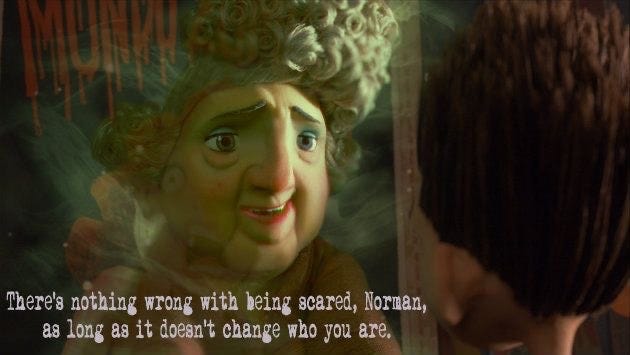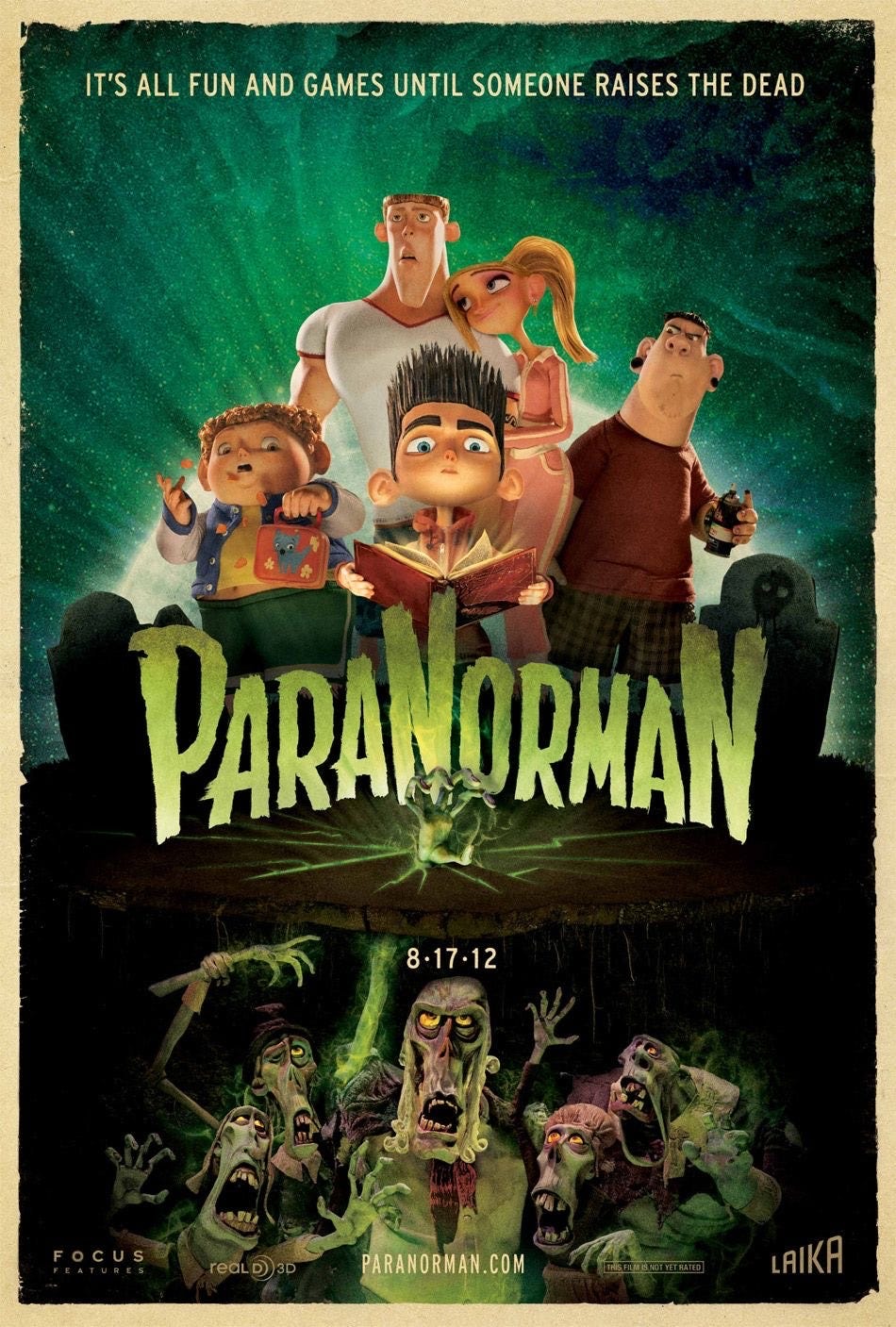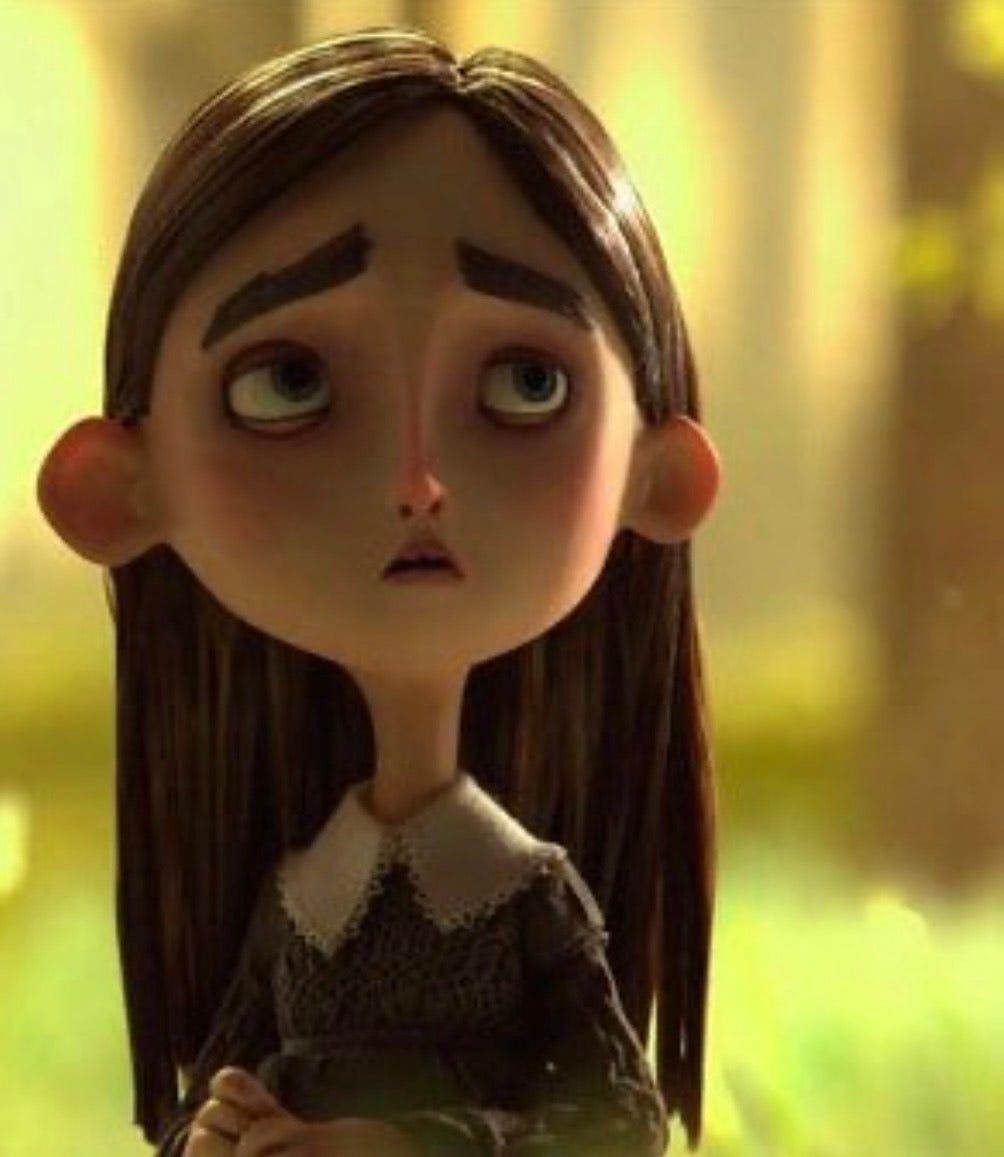hello, hello! we’re well into September and i am sending heaps of light, warmth and hugs. like the secret operative that i am, i disappeared to finish my book. finally, Waiting on a Rapture is on its way and i am keen to announce that it will be available as an eBook on November 1st. here is the playlist for the poetry collection. more information and pre-order dates will be released soon! <3
this essay will be a part of a series where i dissect some of my favourite and most influential animations. only a few know this about me, but i animate as a hobby and it is something that speaks visually to my love for storytelling. i’d love to slowly introduce it as part of my future creative feats. i’m keen to show you more :)
a quick note: the studio that produced this film, as well as others like Coraline, has been the subject of significant discourse in recent years. a range of issues has come to light, including ex-employees documenting mistreatment in the workplace, the studio’s anti-union stance, and the fact that it is funded by Nike through nepotism (which, while not inherently bad, can create an environment where harmful practices may occur).
i believe ethical consumption is a deeply personal experience, and i respect that everyone approaches it differently. however, what i am not impartial to is the exploitation and harm of workers. for some, boycotting the studio is a vital form of protest, and i understand the importance of this approach as someone who actively practices the boycotting of certain brands. our methods of supporting the employees who were mistreated may vary, but their well-being should remain our priority.
with that being said, i do not condone supporting Laika as an organization, nor do i take the mistreatment of its employees lightly. however, i believe there are ways to appreciate the hard work of the creatives involved in these films without directly supporting the studio—such as streaming through alternative means (though i cannot specify these for legal reasons). it’s possible to enjoy art while being critical of the system that produced it, but this is ultimately a personal choice, and all perspectives on this matter are valid.
ParaNorman is one of my favourite films, and it’s okay to cherish it. but it’s also crucial to acknowledge the people who dedicated their lives to creating it, many of whom may have experienced hardship and serious harm during its production.
ParaNorman is a feature film that set the course of my love for stop-motion animation. it follows Norman Babcock (voiced by Kodi Smit-McPhee), an unassuming, lonesome and hilariously offbeat 12-year-old, who can see and speak to dead people. though this sounds like a half-cooked setup for a mediocre horror movie, it was far from it.
Norman is tasked with putting a vengeful spirit, Aggie Prenderghast, back to sleep before she destroys the town of Blithe Hollow. in the late 1700s, Aggie was wrongfully executed for witchcraft, and ever since, she awakens each year, requiring a 'keeper' to soothe her with a bedtime story. this year, it’s Norman’s turn. instead of simply reading her to sleep, Norman teams up with his bratty big sister, a goofy bully, a sardonic jock who happens to be gay (this becomes important later on for the most comical reason), and his lovable friend Neil. together, they must navigate a town in chaos and mend the past to stop Aggie from unleashing her wrath. filled to the brim with deeply authentic characters, the profound subtext about our capacity for cruelty and its comedic timing sent from above, it makes complete sense why this film had me hooked.
our protagonist was a bit too real for the fictional town of Blithe Hollow. his strangeness was much like my own: complex and not easily translatable. Norman wasn’t overtly ‘weird’ (whatever that means) just intrinsically different. the creative choice was to show that he was isolated, primarily because the other kids saw him as the ‘loser who claims to see ghosts’. but when you zoom into his character, you find someone so intensely secure in themselves, it makes others uncomfortable. what is equally heart-breaking, however, is that this may not have been a choice on Norman’s part.
it is rather likely that the other kids just couldn’t figure out how to relate to him, even though the Norman that is presented to us as the audience, was hilariously juvenile and boyish when he wanted to be. because of this, his isolation had very quickly shifted from a social circumstance to intentional and comfortable solitude. thus setting the tone for our protagonist; this somewhat reluctant hero, traversing the storyline with a power that had virtually nothing to do with him seeing dead people and everything to do with him being sensitive to the world around him. that was a beautiful and specifically crafted purpose point in the film. Norman tapped into the most human part of himself, to later execute a heroic act that would save his town, the zombie anti-heroes and Aggie in the process. his ability to tap into sensitivity was understatingly stunning. excuse my romanticism, but that sort of emotional depth is indicative of a much larger and more spiritual gift: the constant mending of community.
here he was, being pushed away by others and yet, feeling this call to pull Aggie closer. to listen to her rather than run from her torrent of emotional outbursts. she damn near killed Norman, but he was stubborn in his pursuit to understand Aggie and seek to know her wounds more intimately. though the young boy’s bravery was admirable, his response drawn from a foundation of sensitivity was astounding to me. i found myself in Norman because he wanted nothing more than for others to be okay, but not at the expense of his health. he was calculated about each risk, cognisant of how it would affect not only himself but the team of characters who travelled with him too. i think this is also a fantastic display of altruism. alongside Aggie, he made a point of acknowledging the feelings of the fearful citizens and the zombies. this little boy so courageously exercised empathy. and i consider it courageous because many of us wouldn’t dare hear a zombie out about anything! he valued everyone’s part in the broader story and recognised each spirit affected in their own way. it’s pretty obvious by now how much i love this kid.
this film fed my love for animation through its mastery of stating the obvious but remaining subtle in its presentation. that balancing act is a tricky one; something that isn’t well received in media as of late. i think everything down from the actual sets and puppeteering to the choice of music made the experience so much more compelling (thank you Jon Brion for that freaking killer soundtrack). the set designers brought Blithe Hollow to life with its distinctive post-recession like small town features- a barely functional petrol [gas] station, virtually no areas for children to hang out and a gallowed forest kingdom, seemingly ready to swallow the town and revert to its natural planes oncemore. just a marvel to observe. everything was aged a few years and even the modern things still felt so ancient.
there was a palpable sense of life in this film, from the awkward yet endearing tensions between Norman and his father, Perry Babcock, to the deep regret etched into the faces of the zombies who had failed Aggie centuries ago. a particularly special relationship was that of Norman and his grandmother. although she was already a ghost, their close-knit bond was heartwarming to witness. seeing someone so confidently believe in Norman's potential, despite his differences, was incredibly reassuring to me as a kid. it felt like a place could be made for me at the table, much like Bruno in Encanto, finding space for ourselves even when we don’t always feel welcome. humanity was woven throughout the story, bringing warmth and depth to its supernatural elements.

ParaNorman will always be one of my favourite movies. of course, this idea of being ‘normal’ had an incredibly rigid image to it and so much can be said about how rudementary some of the commentary was in hindsight. but i think this film accomplished a lot for its time. it sparked my desire to create characters that embodied themselves without fail, pushed me to be sincere in my pursuit for narrative quality and taught me the meaning of cinema for the soul. because of Norman and his ragtag team, i am drawn closer to animating a universe that is representative of the human condition, but mirrors us in thoughtful, empathetic ways. please friend, i urge you to watch this film, even if its for shits and giggles!
yours,
Thando. x








